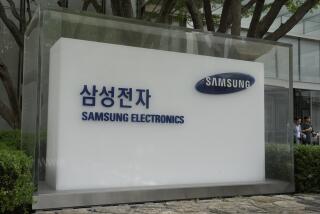Samsung ordered to pay Apple just $120 million for infringing patents
SAN JOSE — A federal jury has handed a symbolic victory to Samsung by ordering the South Korean smartphone maker to pay only a fraction of the damages that Apple had requested in the rivals’ high-profile patent trial.
After several days of deliberation, an eight-person jury found Friday that some Samsung Electronics Co. smartphones and tablets infringed patents held by Apple Inc. However, the jury ordered Samsung to pay only $119.6 million in damages, a far cry from the $2.2 billion Apple was seeking. The amount is also much smaller than the $1-billion award a jury ordered Samsung to pay in a trial over similar issues in the same courtroom two years ago.
During the latest monthlong trial in U.S. District Court in San Jose, Samsung attorneys insisted that the company did not copy Apple products. But even if Samsung was found to infringe, they argued, the patents were for features so trivial that they played little role in decisions by consumers about which smartphone or tablet to buy.
------------
FOR THE RECORD:
Apple Samsung verdict: An article in the May 3 Business section about a federal court jury verdict in the patent trail pitting Apple and Samsung misidentified Samsung lawyer John Quinn as Peter Quinn. —
------------
Samsung attorneys said the request for such large damages was driven by Apple’s greed and a desire to use the courts to reverse the market share Apple was losing to Samsung products that run on Google Inc.’s Android mobile operating system.
“What this case is really about is Apple trying to limit consumer choice and to limit the advantage of its main competitor, Google’s Android,” Samsung attorney Peter Quinn said in his opening statement. “It’s trying to gain from you in this courtroom what it’s lost in the marketplace.”
The jury did find that Samsung violated a patent for Apple’s slide-to-unlock feature and a patent for a process for placing links in apps. However, the jury also found that Samsung did not violate other patents for technology that enables users to search their phones for information or sync information between apps.
“Today’s ruling reinforces what courts around the world have already found: that Samsung willfully stole our ideas and copied our products,” said Apple spokeswoman Kristin Huguet. “We are fighting to defend the hard work that goes into beloved products like the iPhone, which our employees devote their lives to designing and delivering for our customers.”
However, the jury also found that Apple violated a patent Samsung held for folders on digital cameras, and it ordered Apple to pay $158,400 in damages.
Although the legal battle between the companies continues to ramble on, and there is a high likelihood that one or both parties will appeal the latest verdict, analysts say the latest trial probably won’t have much effect on consumers. They also say it’s an example of the futility of seeking decisive victories in the courtrooms over subjects as complex as software intellectual property.
“The verdict clearly shows that software IP is a hard thing to prove definitively if it was infringed upon,” said Patrick Moorhead, lead analyst at Moor Insights & Strategy. “The latest jury rendered less than 10 times the damages as the earlier trial. The system is broken, plain and simple as the lines are gray.”
The legal fight has turned on the finer points of U.S. patent law, but the bruising conflict has its roots in Apple founder Steve Jobs’ belief that Google’s Android is essentially a bad copy of the operating system for Apple’s iPhone.
“Our lawsuit is saying, ‘Google, you ... ripped off the iPhone, wholesale ripped us off,’” Jobs told his biographer, Walter Isaacson. “I will spend my last dying breath if I need to, and I will spend every penny of Apple’s $40 billion in the bank, to right this wrong. I’m going to destroy Android, because it’s a stolen product.”
Android has since overtaken Apple’s iOS to become the leading smartphone operating system in the world, powering the smartphones and tablets sold by Samsung, among others. Not only has Apple seen its early dominance in smartphones vanish, but the gap in market share between Android tablets and the iPad is also starting to close.
Although Judge Lucy Koh, who has presided over both major patent trials, upheld the verdict and most of the damages in the first trial, she declined to implement a permanent injunction on Samsung products. Such an injunction could have at least had some effect on sales, experts said. But without such a ban, the first trial and its outcome have done little to stem Samsung’s momentum.
The latest trial covered more recent products, including the Samsung Galaxy S3 and Galaxy Tab 2. However, much like with the first trial, by the time the matter reached the courthouse, many of the products were quite dated and, in some cases, no longer available. Samsung recently launched the Galaxy S5.
Twitter: @obrien
More to Read
Inside the business of entertainment
The Wide Shot brings you news, analysis and insights on everything from streaming wars to production — and what it all means for the future.
You may occasionally receive promotional content from the Los Angeles Times.











